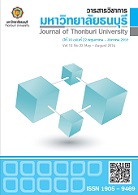แนวทางการพัฒนาการท่องเที่ยวจังหวัดเชียงใหม่ตามทัศนะของนักท่องเที่ยวเพื่อความยั่งยืน
Keywords:
การตัดสินใจ, ท่องเที่ยว, ทัศนะ, จังหวัดเชียงใหม่, Decision Making, Tourism, Attitude, Chiang Mai,Abstract
การวิจัยครั้งนี้มีวัตถุประสงค์เพื่อหาแนวทางการพัฒนาการท่องเที่ยวจังหวัดเชียงใหม่ตามทัศนะและปัจจัยการตัดสินใจของนักท่องเที่ยวที่มาท่องเที่ยวในจังหวัดเชียงใหม่ เป็นการวิจัยสำรวจโดยใช้แบบสอบถามเป็นเครื่องมือ โดยประชากรและกลุ่มตัวอย่างได้แก่ นักท่องเที่ยวชาวไทยและต่างประเทศที่มาท่องเที่ยวในจังหวัดเชียงใหม่ จำนวน 400 ราย ผลการวิจัย พบว่า ปัจจัยที่มีผลต่อการตัดสินใจเลือกมาท่องเที่ยวในจังหวัดเชียงใหม่ของนักท่องเที่ยว โดยในภาพรวมมีการตัดสินใจ อยู่ในระดับมาก (=3.70, S.D. = 0.98) โดยสามารถแยกในแต่ละด้านของปัจจัยดังนี้ ด้านทรัพยากรของการท่องเที่ยว อยู่ในระดับมาก ( =3.80, S.D. = 1.12) ด้านความปลอดภัย อยู่ในระดับมาก (=3.74, S.D. = 0.63) ด้านสิ่งอำนวยความสะดวก อยู่ในระดับมาก (=3.66, S.D. = 0.74) ด้านสินค้า ของที่ระลึก อยู่ในระดับมาก ( =3.69, S.D. = 0.94) ด้านสภาวะเศรษฐกิจและการเมือง อยู่ในระดับมาก ( =3.63, S.D. = 0.69) และทัศนะของนักท่องเที่ยวต่อการตัดสินใจเลือกมาท่องเที่ยวในจังหวัดเชียงใหม่ พบว่า ในภาพรวมมีทัศนะต่อการตัดสินใจ อยู่ในระดับมาก ( =3.64, S.D. = 0.89) แนวทางในการพัฒนาการท่องเที่ยวจังหวัดเชียงใหม่ตามทัศนะของนักท่องเที่ยว ควรมุ่งเน้นดังต่อไปนี้ 1. อนุรักษ์ วัฒนธรมท้องถิ่น ประเพณี วิถีชีวิตบริบทพื้นที่ 2. ความต่อเนื่อง (Continuity) สร้างความต่อเนื่องของทรัพยากรธรรมชาติ และความต่อเนื่องของวัฒนธรรม แหล่งท่องเที่ยวโดยคํานึงถึงขีดความสามารถในการรองรับ 3. คุณภาพ (Quality) เน้นคุณภาพของ สิ่งแวดล้อม คุณภาพของประสบการณ์ นันทนาการที่นักท่องเที่ยวได้รับ และคุณภาพชีวิตของคนในชุมชน และ 4. ความสมดุล (Balance) สร้างความสมดุลระหว่างความต้องการอุตสาหกรรมการท่องเที่ยว ความต้องการของชุมชนท้องถิ่น
GUIDELINES FOR SUSTAINABLE CHIANG MAI TOURISM DEVELOPMENT ACCORDING TO THE ATTITUDE OF TOURISTS
The aim of this research is to find the guidelines for Chiang Mai tourism development according to the attitude of tourists and the factors affecting tourists’ decision-making for visiting Chiang Mai. Questionnaire is conducted as a research tool for collecting data and the samples are 400 tourists, both Thai and foreign tourists who travel to Chiang Mai. The results showed that the factors affecting the decision-making to travel to Chiang Mai in overall show at high level ( =3.70, S.D. = 0.98). It can be explained in each factor of the followings: the resources for tourism factor with high level of agreement ( =3.80, S.D. = 1.12), security factor with high level of agreement ( =3.74, S.D. = 0.63), facilities factor with high level of agreement ( =3.66, S.D. = 0.74), product and souvenir factor with high level of agreement ( =3.69, S.D. = 0.94), and the economic and political conditions factor with high level of agreement ( =3.63, S.D. = 0.69). The attitude of tourists toward the decision-making to travel to Chiang Mai in overall is at high level ( =3.64, S.D. = 0.89). The guidelines for Chiang Mai tourism development according to the attitude of tourists should emphasized on the followings: 1. Preserving culture, traditions and local culture context; 2. Continuing to set up natural resources and continuity of culture of the tourist area with regard to its ability to adapt; 3. Emphasizing on the quality of the environment, experience, and recreation that tourists will get as well as the quality of life of people in the community; and 4. Balance between the needs of the tourism industry and the needs of local communities.







